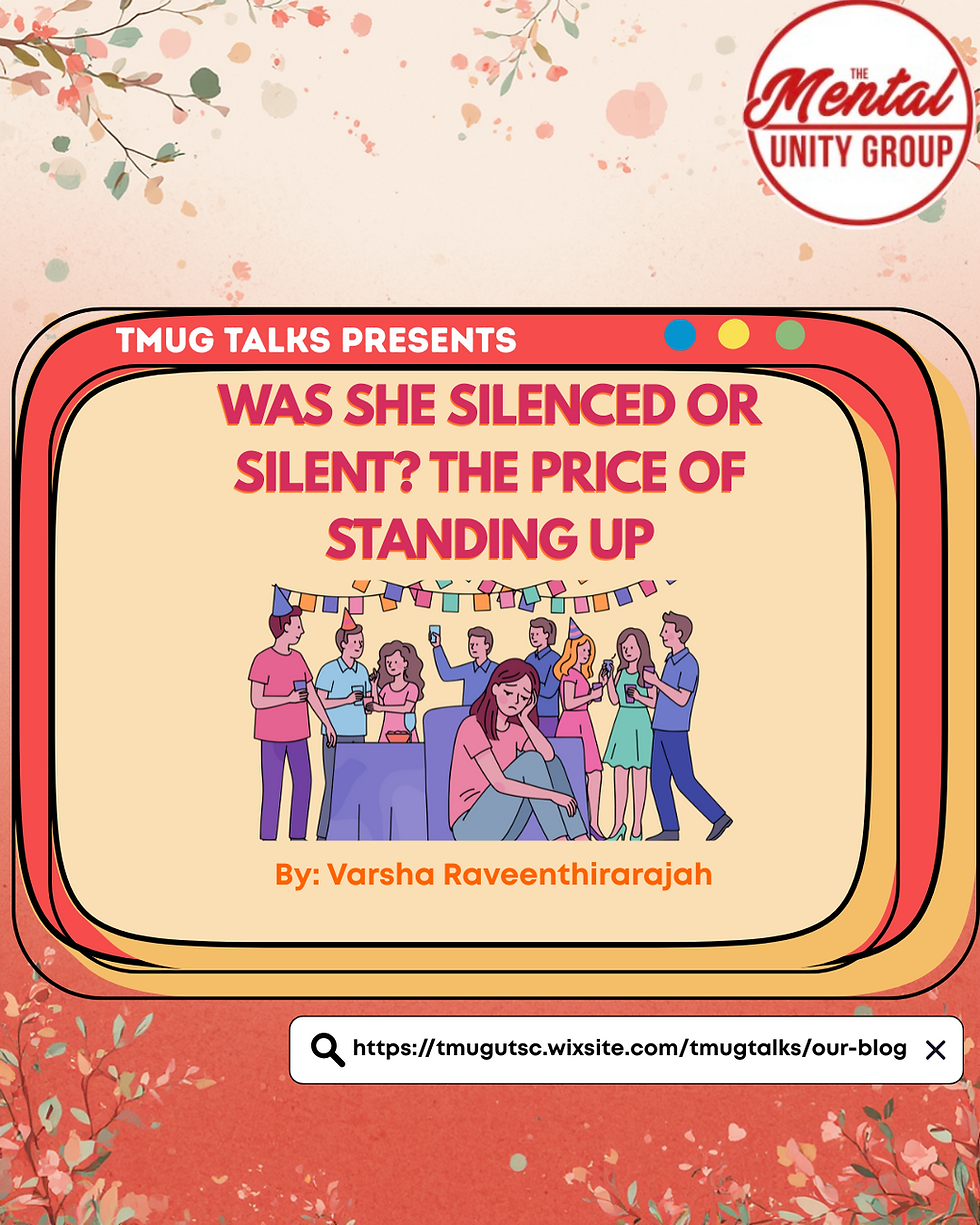Exploring Intersectionality in Global Mental Health Beyond Borders
- TMUG Talks

- Jun 4, 2024
- 3 min read
Introduction
This blog post series explores the intersection of mental health and a range of societal dynamics that are being addressed in today’s world. Each post will spotlight on various aspects of this complex relationship, exploring how individual well-being intersects with broader social structures.
Gender Disparity in Mental Health
Written By: Abigail Fernandes, Blog Writer, Conservation and Biodiversity Double Major
Women are twice as likely as men to be diagnosed with a mental illness (Yu, 2018). The driving cause of this? Gender inequality. Risk factors that disproportionately affect women and cause gender inequality are “domestic violence, sexual abuse, unpaid caring work, higher hours of work, low social status, and lack of access to reproductive rights and education” according to Shoukai Yu (2018). In her study on the hidden impacts of inequality on mental health, she found that gender inequality positively correlates with depressive disorders in women. This brings attention to recent studies which assert that it is not only genetics which can cause mental disorders, but one’s environment and exposure to stress. So what is to be done? The answer is simple but not easy. We must fight against oppression in all forms and advocate for gender equality. This statement seems quite daunting. How can we possibly oppose and eradicate all the oppression and inequality that exists in the world? If we’ve learned anything from March, when Women’s History Month is celebrated in many countries, we’d know that we do not have to do this alone. Following in the footsteps of those who sought radical change and progress in the past, we must join hands and amplify each other’s voices so that no one can deny that they heard us. That is how we can demand a healthier and happier world for women across the globe.
Sources:
Yu, S. (2018). Uncovering the hidden impacts of inequality on Mental Health: A Global Study. Translational Psychiatry, 8(1). https://doi.org/10.1038/s41398-018-0148-0
World Introvert Day
Written by: Faria Islam, Blog Director, Health Studies and Psychology Double Major
Is silence your secret language? Does small talk drain your social energy, leaving you in need of recovery? Do you catch yourself mentally rehearsing before even the simplest conversations? As introverts, fitting in can feel like an ongoing challenge in a world that seems to celebrate the extroverted. But here's the comforting truth – you're not alone! Many of us wear an extroverted mask during social gatherings and job interviews, driven by an internal battle like anxiety, anger, low self-esteem, and other mental well-being concerns. To recognize all these challenges, let's collectively introspect this matter during the World Introvert Day celebrated internationally on January 2nd each year.
This special time provides us the opportunity to connect, share stories, and celebrate what makes us unique. As we create our resolution list in January, let's also add to the list embracing our introverted selves and extending the same understanding to the introverts around us. The more we show acceptance and spread awareness about it, the more introverts are finding support and strength to accept themselves just as they are. If you're an introverted student, remember you're not alone on this journey. Take this time to choose your career thoughtfully, aligning it with your personality. Ultimately, it's your responsibility to take care of yourself, so why not do it wholeheartedly? As philosopher Michel de Montaigne says, “The greatest thing in the world is to know how to belong to oneself.”
Sources:
Feinsod, M., & Langer, K. G. (2012). The Philosopher’s Swoon—The Concussion of Michel de Montaigne: A Historical Vignette. World Neurosurgery, 78(3–4), 371–374. https://doi.org/10.1016/j.wneu.2011.12.007
Twinkle. (2024, January 2). World Introvert Day 2024: Date, theme, history, significance, facts & more. Jagranjosh.com. https://www.jagranjosh.com/general-knowledge/world-introvert-day-1672602697-1
Conclusion
Overall, as we explore the intersection of mental health and society, we find deeper layers that may not always be immediately visible. It's a reminder that people may be dealing with struggles that aren't readily apparent, and it's up to us to be empathetic and observant. By looking beyond the surface, we can offer support and create a more compassionate environment for everyone. Together, we can cultivate a culture of understanding, acceptance, and resilience where everyone feels valued, heard, and supported in their journey toward mental wellness. As we navigate our way through life, let's start by extending compassion to those around us, right here, right now!





Comments